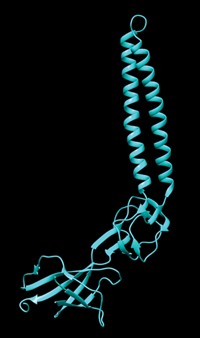Advertisement
Grab your lab coat. Let's get started
Welcome!
Welcome!
Create an account below to get 6 C&EN articles per month, receive newsletters and more - all free.
It seems this is your first time logging in online. Please enter the following information to continue.
As an ACS member you automatically get access to this site. All we need is few more details to create your reading experience.
Not you? Sign in with a different account.
Not you? Sign in with a different account.
ERROR 1
ERROR 1
ERROR 2
ERROR 2
ERROR 2
ERROR 2
ERROR 2
Password and Confirm password must match.
If you have an ACS member number, please enter it here so we can link this account to your membership. (optional)
ERROR 2
ACS values your privacy. By submitting your information, you are gaining access to C&EN and subscribing to our weekly newsletter. We use the information you provide to make your reading experience better, and we will never sell your data to third party members.
Antibiotics
Bacteria behind tooth decay make antibiotics that take out their competitors
Molecules from pathogenic strains of Streptococcus mutans inhibit beneficial bacteria in the mouth
by Jyoti Madhusoodanan,special to C&EN
January 30, 2020

Got cavities? Blame Streptococcus mutans, a bacterium found in the mouth that produces acids strong enough to dissolve tooth enamel, allowing the microbe to bore into teeth and cause decay. Now, researchers report that some particularly pathogenic strains of S. mutans have extra arsenal at their disposal: a suite of antibacterial compounds that inhibit the growth of beneficial bacteria that help protect against dental cavities (ACS Infect. Dis. 2020, DOI: 10.1021/acsinfecdis.9b00365).
Microbiologist Anna Edlund of the J. Craig Venter Institute and her colleagues investigated a set of genes, known as the muc gene cluster, that is carried by some S. mutans strains, to see why they might be important to these pathogens. They found that muc is responsible for producing reutericyclin, an antibiotic also produced by bacteria that ferment sourdough, changing the microbial community within the bread.
Edlund, along with Bradley Moore of the University of California San Diego and their colleagues, studied the muc gene cluster in S. mutans taken from the mouth of a child with severe dental caries. When they introduced a mutation that knocked out one of the genes, mucD, the cells did not produce four metabolites made by the unmutated strain. The team identified them as reutericyclin, two of its analogs, and another derivative named mutanocyclin—all known antibacterial molecules.
To understand why S. mutans might produce these antibiotics, the researchers created mutants of the strain lacking different muc genes, and cultured them in the presence of six other common bacteria that are part of a healthy oral microbiome. They found that the pathogenic strain and its mutants strongly inhibited the beneficial species’ growth; the most effective inhibitor was a mutant that produced only reutericyclin.
In contrast, a lab strain of S. mutans that lacked the muc gene cluster inhibited these other microbes much less, suggesting that the pathogenic strain—which causes much more severe disease—might use these molecules to remove the bacteria that block its growth.
Future studies will need to determine whether these secreted molecules play similar roles within the human mouth, not just in petri dishes, says microbiologist Jeffrey Banas of the University of Iowa, who was not involved with the work. The discovery is an “interesting variable” that could help explain differences between S. mutans strains that cause severe disease and those that are less harmful, he adds. “People have looked for strain differences for years” to figure out what sets the bad ones apart, Banas says. “This is the tip of the iceberg and is certainly worth pursuing. Acid production really allows these bacteria to gain a foothold, and then something—perhaps this antibiotic activity...helps it even further.”
The work further cements the importance of S. mutans as a “keystone pathogen” in dental caries, says José Lemos of the University of Florida, who was not involved with the work. “Its presence really drives the ecology of the mouth toward disease.”





Join the conversation
Contact the reporter
Submit a Letter to the Editor for publication
Engage with us on Twitter